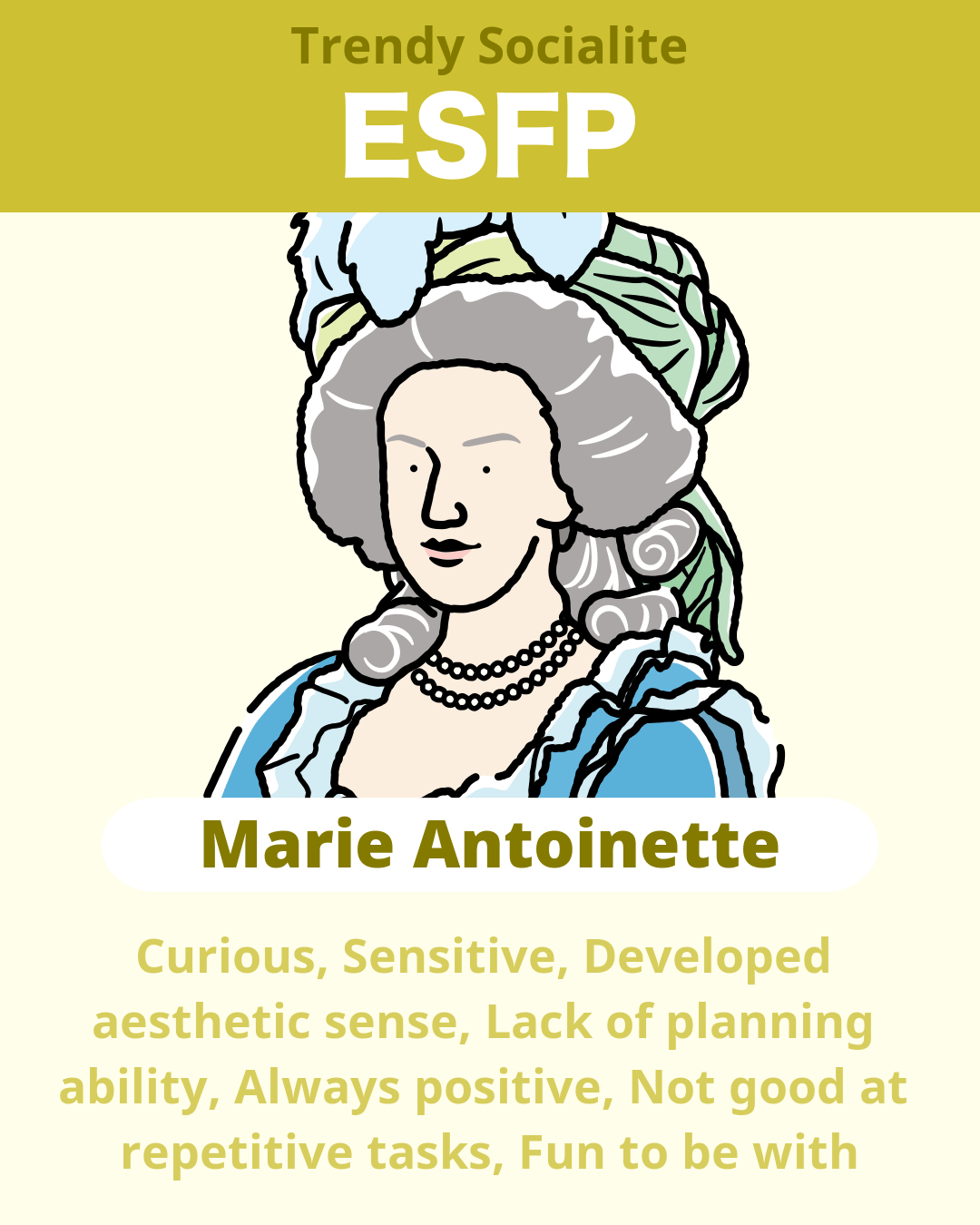
People with the ESFP personality type, also known as the Entertainer personality type, are great at entertaining others. They like spending time and enjoying a variety of experiences together with others, such as food, travel, and fashion. They are sociable and good with people, and their cheerful and positive temperament makes them popular with those around them. They are also good fits for roles in an organization that facilitate relationships and motivate their colleagues. ESFPs are highly sensitive and are quick to adopt what they find beautiful, such as fashion and interior designs. They seek out change, dislike boredom, and are not good at working on things over long periods of time. ESFPs are vulnerable to temptation and lack discipline, so they need to be careful not to be late or wasteful.





| Ranks | Types | % | |
|---|---|---|---|
| 1 | INFP | Vincent van Gogh | 13% |
| 2 | ENFP | Anne Frank | 11% |
| 3 | ISFP | Mozart | 8% |
| 4 | INTP | Albert Einstein | 8% |
| 5 | INFJ | Nightingale | 8% |
| 6 | ESFJ | Andrew Carnegie | 7% |
| 7 | ISFJ | Mother Teresa | 7% |
| 8 | ESFP | Marie Antoinette★ | 6% |
| 9 | ENTP | Thomas Edison | 6% |
| 10 | ENFJ | Joan of Arc | 5% |
| 11 | ISTJ | Sigmund Freud | 4% |
| 12 | ISTP | Spartacus | 4% |
| 13 | INTJ | Leonardo da Vinci | 4% |
| 14 | ESTJ | George Washington | 3% |
| 15 | ESTP | Columbus | 3% |
| 16 | ENTJ | Napoleon | 3% |
People treat personality types like horoscopes way too often. People often think these acronyms say something about who you are or what will happen to you. But the MBTI and other personality tests just tell you about your preferences and how you act.
Even though you may always think, learn, and act in certain ways, you can change or adapt your actions. That's why it's important to know your personality type's strengths and weaknesses, so you can figure out your problems and learn how to solve them.
The ESFP is a natural performer who loves evolving the center of attention and the life of the receptionist. They are lively, funny, and interesting and don't mind acting silly if it makes folks laugh. Let's look more closely at the pros and cons of the ESFP.
Carl Jung's work 100 years ago started the modern study of personality. Jung pointed out the differences between sensing and intuition, thinking and feeling, and introversion and extroversion as ways of being. The Myers-Briggs Type Indicator was built on Jung's ideas, and many other personality systems use the same criteria.
Most clinical psychologists today would rather think of personality functions and behaviors as being on a single continuum than as being in two different types. Still, the MBTI and other personality tests like it are very popular and useful at work, school, and in relationships.
The "E" in ESFP stands for "extroverted," which is how you use energy and focus. Extroverts get energy from participating in activities and events and being around many people. They like action and excitement and getting people together to do things. Also, they often think when they say things aloud and figure out what they mean by discussing their ideas and troubles with others.
The S in ESFP stands for sensing, which shows how you like to learn and remember new things. Sensing people prefer to pay attention to things in front of them and information they can see, hear, smell, taste, and touch.
Their positive attitude often rubs off on other people, and they often use their social skills and sense of drama to cheer up, motivate, and inspire others. They pay attention to real facts and details and learn best by doing things themselves. They like information that is useful and can help them solve their problems.
The F in ESFP stands for feeling, which is how you like to make decisions. A person with a feeling personality type likes to make decisions depending on the conditions and the people involved.
They think about the different points of view and try to create decisions that create everyone happily and work together. They know that what tends to work in one situation might not work in another, but they also usually know how to talk to people in a warm, caring, and discreet way.
The P in ESFP stands for experience, which is how you act in the outside world and how you want to be seen. A perceiving person likes to understand and adapt to the world, keeping an open mind and being flexible. They don't try to control things; they just follow the flow.
They don't plan how they spend their time and are open to new things. The ESFP personality type is titled The Performer because this type loves to be the center of attention. They are friendly and spontaneous, like trying new things, and live in the moment.
They also care about other people's feelings, which makes them warm and caring. The ESFP will dance, act like a clown, or drag one's friends into an adventure with style. About 4-9% of Americans are ESFPs, and women are a little more likely than men to be this type.
From the short description above, you can likely think of some of the strengths of an ESFP.
The ESFP adores starting new activities and experiences, but they can also have a wonderful time only hanging out with buddies. They are always eager to meet new people, try new things, and have a good time in the present.
The ESFP will go after their goals and ideas with passion and excitement, but they will also get just as excited about their friends and family's goals and ideas. They will give up their time and go out of their way to help others succeed.
The ESFP is not always trendy, but they are known for having a good sense of style. No matter what they wear, talk and move, or set up their space, their style is always unique, imaginative, and done with a little extra flair.
The ESFP always looks on the bright side of life and hopes for the best. They don't think about bad things that happened in the past and don't hold grudges. Their positive attitude often rubs off on other people, and they often use their social skills and sense of drama to cheer up, motivate, and inspire others.
The ESFP never misses a chance to have fun. They know that sometimes the most exciting and interesting things happen when you least expect them to. But they are just as likely to drop everything to help a friend, listen with empathy, or save the day. In a crisis, you can always ask an ESFP for help, and because of their Sensing nature, they will find ways to help immediately.
Even though ESFPs are naturally outgoing and confident, they are also very sensitive and take things personally. So, when they feel like being questioned, criticized, or overlooked, they often get angry, defensive, and hurt.
The ESFP personality type needs excitement and stimulation and can't stand to be bored. They have a short attention span and lose interest quickly when nothing happens.
Impulsiveness is the downside of being spontaneous as an ESFP. They often do things without much thought and expect everything to be fine. The ESFP's lack of focus and tendency to act on impulses make it hard for them to make long plans or work hard to reach goals.
The ESFP is charismatic and interesting, and their big personality and distinctive style make them the center of attention. They have a short attention span and lose interest quickly when nothing happens. They care about other people and must improve the world, but they rarely have the time and drive to work on long-term goals.
As a result, ESFPs should choose occupations and activities that play to their natural abilities rather than ones that demand extended periods of intense, introverted thought. For instance, most ESFPs would not be happy working as analysts or engineers. ESFPs should instead think about these types of jobs:
Most personality types must find ways to minimize their weaknesses while staying true to themselves to grow and change. But for ESFPs, the way to grow as a person is the opposite. They should focus on their strengths. For example, most ESFPs have big, dramatic personalities, many styles, and a natural place in the spotlight.
But society often discourages these traits by telling kids to be quiet and pay attention, telling teens that their big dreams are unrealistic, and telling adults that it's time to get real and stop fooling around. This kind of messaging can do a lot of damage to the ESFP, who may never have had the chance to embrace their more outgoing side and live a full life, so self-love is often the first step on their path to personal growth.
ESFPs do best when they have freedom over their schedule and how they do their work. This type of person works best with a less hands-on management style. ESFPs want to help others and build a sense of community among employees.
People usually like how bold an ESFP is, so keeping them energized will probably help the rest of the employees. Because of their strengths, ESFPs are best suited to work in places with a lot of variety and social interaction.
This is a great trait for people who want to work as counselors or social workers. The Entertainer is creative and has a good eye for design. He could do well as an artist, photographer, or fashion designer. A person with an ESFP personality can shine in any form of entertainment, like music, acting, or dancing.
It has been shown that loving yourself makes you happier and healthier. When you love yourself more, you can see yourself more clearly and accept yourself fully. It is also a wonderful method to build up your emotional strength, which can help an ESFP deal with their tendency to be too sensitive.
Even though you can't drop everything every time and go on an adventure, you can make a list of fun things to accomplish and pick one randomly when you want a change of pace. Try going a different way to work, attempting a food you've never had, or cruising to a random dot on a map to break up your daily routine.
If you have never heard of the MBTI personality system, read this guide to learn more about the 16 types. And if you don't understand what kind of person you are yet, try one of the tests on this list. The ESFP is among the most fun and personable personality types. They bring optimism and fun wherever they go. Enjoy the ESFPs in your life and the ESFP inside you.